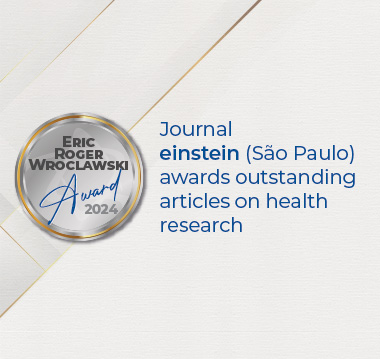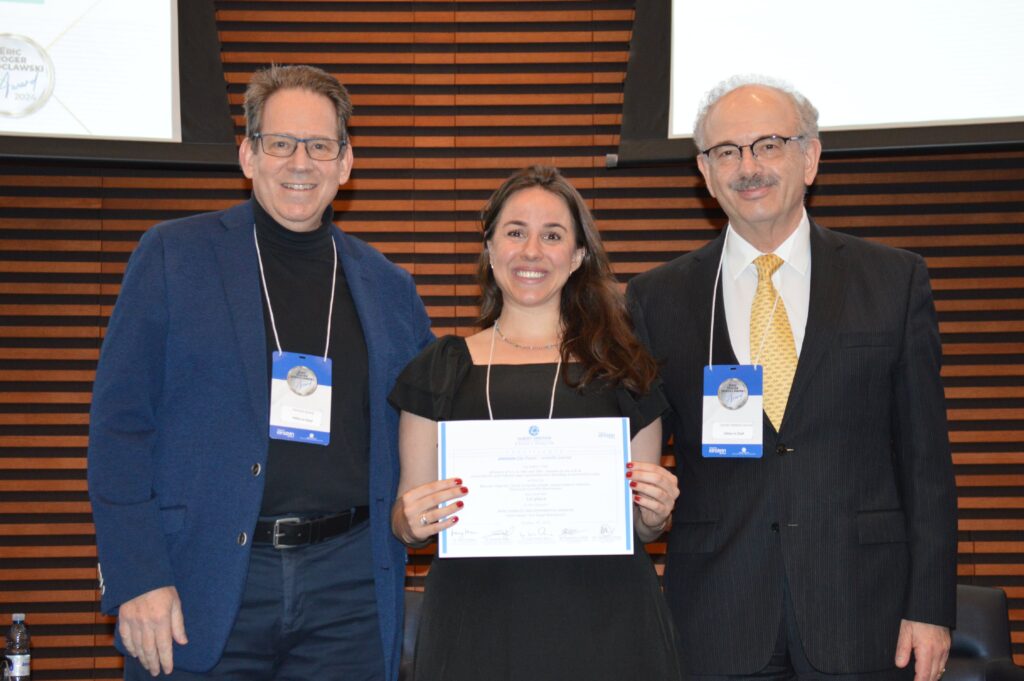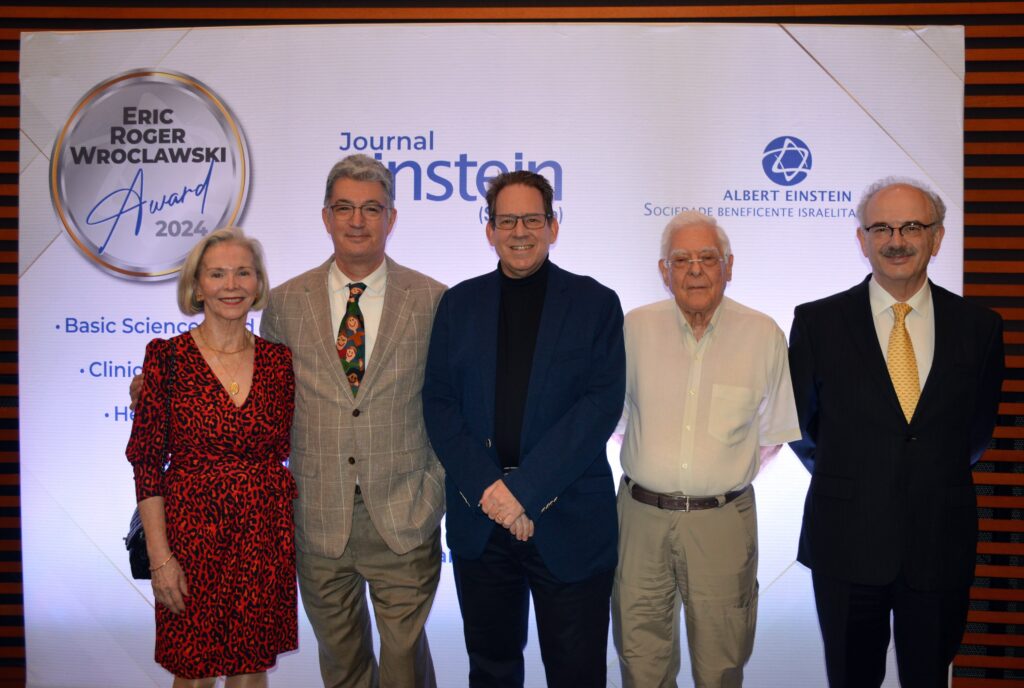Journal einstein (São Paulo) awards outstanding articles on health research

The award, organized by the journal, recognized outstanding contributions in the categories of Basic Sciences and Experimental Medicine, Clinical Medicine, Health Economics and Management, Multiprofessional Health Care, and Surgery.
by Rogerio Bordini
Scientific Journalist
On October 10, 2024, the Albert Einstein Teaching and Research Center (SP) hosted the 2024 Eric Roger Wroclawski Award, which since 2006 annually honors original articles published in einstein (São Paulo), the hospital’s open access journal focusing on Medicine and related health areas. The award is a tribute to researcher Dr. Wroclawski, the journal’s first editor and one of its founders. He passed away in 2009, leaving important contributions to urology, in addition to serving as vice president of Einstein and professor at the ABC Foundation School of Medicine.
“I am very honored to have won this award, which represents a milestone in my career,” said Marcela Forgerini, a professor at UNESP Araraquara (Department of Drugs and Medications) and first author of the winning article in the Basic Sciences and Experimental Medicine category. “My research, conducted during my postdoctoral studies, investigated the genetic factors that can lead to bleeding in patients who use acetylsalicylic acid to prevent cardiovascular diseases. After four years of recruiting participants, we discovered that the presence of seven genetic polymorphisms analyzed was not associated with an increased risk of bleeding. This work is essential for understanding pharmacogenetics and ensuring the safety of this medication in the Brazilian population.”

In the Surgery category, first place went to a study that evaluated an open repair technique for spina bifida with biocellulose, performed between 26 and 28 weeks of gestation. “Winning this award is extremely meaningful to me, as it represents recognition for a decade of hard work,” said Denise Araújo Lapa, a fetal surgery specialist at Einstein and leader of the winning study. “I developed an innovative surgical technique in Brazil, and it is gratifying to see that our efforts are being valued. I believe it is essential to publish our research in quality Brazilian journals, as we have many talented people in the country whose ideas deserve to be recognized. Open science is essential, and I am committed to helping more researchers have their voices heard and their discoveries published.”
In the Clinical Medicine category, the study on the temporal and spatial analysis of more than 7,000 cases of measles in the Brazilian Amazon, which occurred between 2018 and 2019, stands out. In the Health Economics and Management category, the original article that explores the perspectives of health professionals on early detection panels for multiple cancers was awarded. In the Multiprofessional Health Care category, the highlight was the construction and validation of the Emergency Oncology Scale (EMOnco), a risk assessment protocol for screening cancer patients in emergency situations. Finally, in the most cited original article category, the study on depression in health workers at the COVID-19 Care and Isolation Center in Villa Panamericana (Peru), which was carried out prospectively in a single center, was selected.
The ceremony, which included presentations by the winning authors themselves, was attended by members of einstein (São Paulo): editors-in-chief Kenneth Gollob and Claudio Roberto Cernea, scientific editor Jacyr Pasternak, and managing editor Edna Rother. In addition, Luiz Vicente Rizzo, director of research and development at Einstein, also shared a statement in recognition of the journal and the authors.
The full list of winners and their original articles is available on the journal’s website.
In favor of open science in health
One of the main goals of the journal einstein (São Paulo) is to promote scientific knowledge in health in a free and open manner, through publications in English. This principle is aligned with the open access movement, which aims to make articles, books, theses and data available online and free of charge, eliminating barriers to access and use. In this way, anyone can read, download, print, distribute and reuse the content, as long as they respect the assigned licenses, such as Creative Commons, and the open access publishing guidelines.
Kenneth Gollob, editor-in-chief of the journal and director of the Center for Research in Immuno-Oncology (CRIO), emphasizes the importance of open-access journals in health to accelerate advances in treatments. “Removing financial obstacles allows researchers around the world to access and use this knowledge in their investigations and clinical studies. One example is immunological oncology, where the free availability of information is essential for the creation of new tests, the understanding of response mechanisms and the identification of effective therapies. Open access, which does not impose publication costs on authors, favors the broad dissemination of this information, bringing benefits to both the scientific community and patients,” he emphasizes.

In 2023, einstein (São Paulo) received its first impact factor (IF) of 1.4 from the Journal Citation Report, an annual publication by Clarivate that evaluates and compares academic journals and establishes the IF for journals indexed in the Web of Science. Edna Rother, the journal’s managing editor, celebrates yet another edition of the award but is already looking ahead to the journal’s next steps. “By organizing the 2024 Eric Roger Wroclawski Award, I am proud to recognize the work of our authors and researchers. This initiative highlights the importance of our Open Access model, which democratizes access to research and celebrates the achievements of the scientific community, motivating us to seek a higher impact factor in the coming years. With the support of our institution and a strong editorial board, we are ready to continue contributing to science and reaffirm our commitment to quality in scientific publishing,” she commented.
It is essential that publishers increasingly commit to providing free access to their articles. The journal einstein (São Paulo ), along with other initiatives that promote the free circulation of scientific knowledge – such as Scielo and Plano S – are examples that demonstrate the importance of democratizing scientific knowledge for the rapid improvement of treatments, techniques and medicines.
See here some images of the ceremony.

